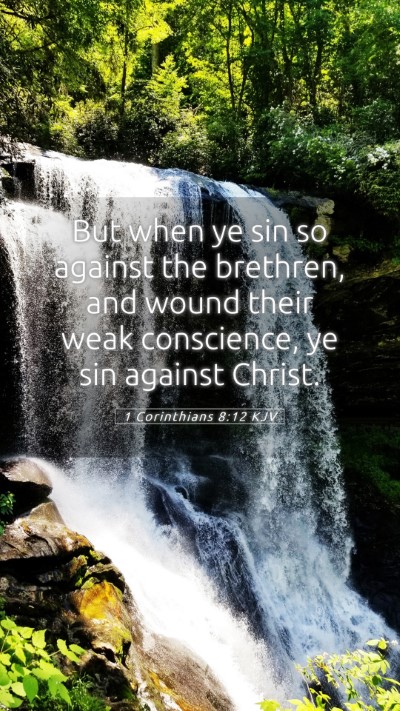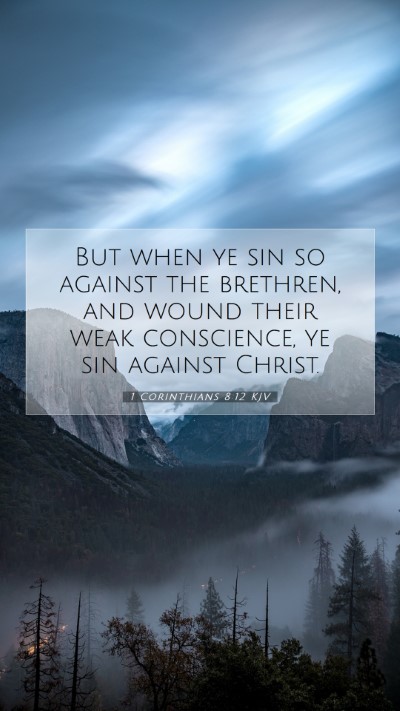Old Testament
Genesis Exodus Leviticus Numbers Deuteronomy Joshua Judges Ruth 1 Samuel 2 Samuel 1 Kings 2 Kings 1 Chronicles 2 Chronicles Ezra Nehemiah Esther Job Psalms Proverbs Ecclesiastes Song of Solomon Isaiah Jeremiah Lamentations Ezekiel Daniel Hosea Joel Amos Obadiah Jonah Micah Nahum Habakkuk Zephaniah Haggai Zechariah Malachi1 Corinthians 8:12 Meaning
What is the meaning of 1 Corinthians 8:12?
But when ye sin so against the brethren, and wound their weak conscience, ye sin against Christ.
1 Corinthians 8:12 Bible Verse Meaning
Bible Verse Commentary on 1 Corinthians 8:12
1 Corinthians 8:12 states, "But when you sin so against the brethren, and wound their weak conscience, you sin against Christ."
Understanding the Verse
This verse emphasizes the serious nature of causing others to stumble in their faith. It highlights how individual actions can significantly impact the faith and well-being of others, especially those who are weaker or less mature in their beliefs.
Insights from Public Domain Commentaries
Matthew Henry's Commentary
Matthew Henry notes that this verse serves as a warning to those who exercise their liberties carelessly. He points out that while believers have the freedom to make choices, they must not forget their responsibility to others, particularly those whose faith may be fragile. The sin mentioned in this verse is not just against fellow believers, but fundamentally against Christ, who is deeply concerned about the welfare of His followers. Henry stresses the importance of love and consideration for others in the exercise of Christian liberty.
Albert Barnes' Notes
Albert Barnes further elaborates that to wound a brother’s conscience is to provoke a spiritual injury that could have lasting consequences on their faith. He emphasizes that the context is important — those who possess knowledge and freedom must not use their strength at the expense of those who are vulnerable in faith. By doing so, they are ultimately disrespecting Christ’s teachings and love for His people. Barnes urges believers to act in love and avoid any actions that could lead others to sin.
Adam Clarke's Commentary
Adam Clarke focuses on the idea that our actions can have a ripple effect within the Christian community. He interprets the 'weak conscience' mentioned as a characteristic of believers who may not fully understand their faith or the implications of certain actions. Clarke highlights that to knowingly lead a weaker brother into sin is not merely a personal sin but an offense against Christ Himself, as Christ identifies deeply with His followers. He calls for a spirit of humility and selflessness in the Christian community, encouraging stronger believers to consider the impact of their actions.
Application to Daily Life
1 Corinthians 8:12 calls for introspection and responsibility among believers. It encourages a lifestyle that reflects consideration for the spiritual health of others. In practical terms, this means being mindful of how we use our freedoms in Christ and ensuring that we do not inadvertently lead others away from Him. The passage advocates for love, patience, and understanding within Christian circles, particularly in matters of faith where opinions and convictions may vary.
Bible Study Insights
- Bible Study Groups: Discuss the ramifications of exercising liberty in Christ.
- Online Bible Study: Examine various interpretations of 1 Corinthians 8:12.
- Bible Study Tools: Utilize commentaries and scriptures to deepen understanding.
Cross References
- Romans 14:21: Highlights the importance of not causing others to stumble over our personal freedoms.
- 1 Corinthians 10:32: Encourages believers to give no offense to others by their actions.
- Galatians 5:13: Talks about serving one another in love as a higher calling than exercising personal freedom.
Conclusion
The essence of 1 Corinthians 8:12 is a call to love and responsibility within the body of Christ. By understanding this scripture, believers are inspired to consider the weight of their actions and the impact they have on fellow believers. This verse offers profound insights into the nature of sin, community, and the love that should bind Christians together.


